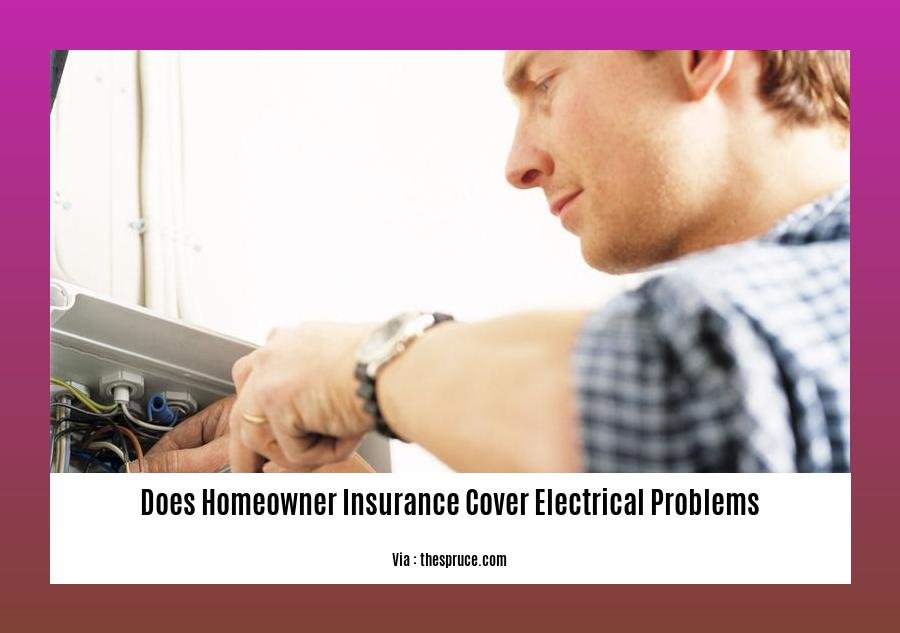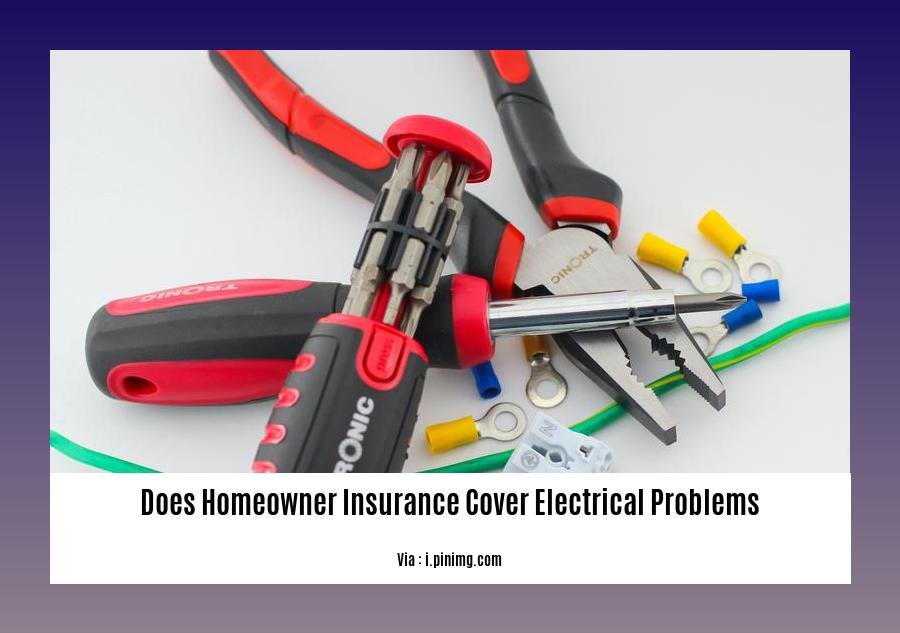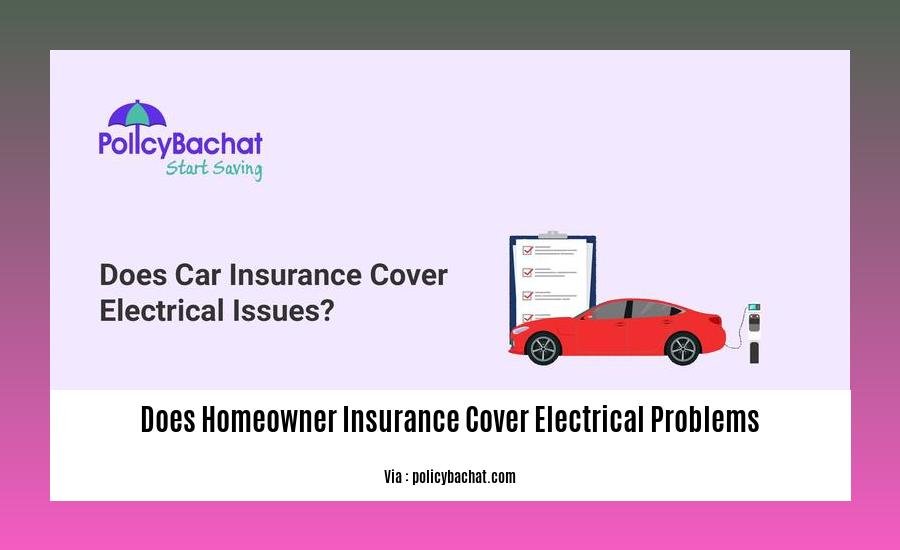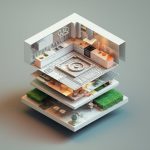If you’re a homeowner, you may have wondered if your insurance policy covers electrical problems. The answer is not always straightforward, as coverage can vary depending on the specific circumstances and the terms of your policy. In this article, [Does Homeowner Insurance Cover Electrical Problems? An Electrician’s Insights], we’ll delve into the details of homeowner insurance coverage for electrical issues, providing valuable insights from an experienced electrician to help you better understand your policy and protect your home.
Key Takeaways:
- Homeowners insurance typically covers electrical problems in the home, except for those related to outdated wiring systems like knob-and-tube or aluminum.
- Older homes built before the 1960s may have outdated electrical wiring, increasing the risk of electrical malfunctions and affecting coverage.
- Coverage for electrical problems can vary depending on factors such as the age of the home, the type of wiring, and the cause of the electrical issue.
- If the electrical problem is caused by negligence or lack of maintenance, coverage may be denied.
- Always consult with your insurance provider to understand the specific coverage and exclusions related to electrical problems in your homeowners insurance policy.
- Regular maintenance and inspections of your electrical system can help prevent problems and ensure continued coverage under your homeowners insurance policy.
Does Homeowner Insurance Cover Electrical Problems?

Electrical problems in your home can be a safety hazard, and they can also be expensive to fix, especially if the problem is major. If you’re a homeowner, you may wonder if your homeowner’s insurance policy covers electrical problems. The answer to the question “does homeowner insurance cover electrical problems?” is generally yes. Most homeowner’s insurance policies provide coverage for electrical problems that occur suddenly and accidentally.
What Types of Electrical Problems Are Covered?
The specific types of electrical problems that are covered by your homeowner’s insurance policy will vary, however, there are some common types of electrical problems that are typically covered, including:
- Wiring: Coverage for damage caused by faulty wiring, such as shorts or overloads.
- Circuit breakers: Coverage for damage caused by faulty circuit breakers, which can result in a power outage or even a fire.
- Electrical outlets: Coverage for damage caused by faulty electrical outlets, such as those that have been improperly installed or that have become loose.
- Electrical panels: Coverage for damage caused by faulty electrical panels, which can lead to a power outage or even a fire.
- Appliances: Coverage for damage caused by faulty electrical appliances, such as a refrigerator or stove.
What Types of Electrical Problems Are Not Covered?
There are also some types of electrical problems that are typically not covered by homeowner’s insurance, including:
- Pre-existing conditions: Electrical problems that existed before you purchased your homeowner’s insurance policy are typically not covered, even if you were not aware of the problems at the time.
- Negligence: Damage caused by neglect or improper maintenance is typically not covered. For example, if you fail to have your electrical system inspected regularly, and a problem develops as a result, your insurance company may not cover the cost of repairs.
- Intentional acts: Damage caused by intentional acts, such as vandalism or arson, is typically not covered.
How to File a Claim for an Electrical Problem
If you have an electrical problem that is covered by your homeowner’s insurance policy, you must file a claim with your insurance company. The process for filing a claim will vary depending on your insurance company, but there are some general steps that you can follow:
- Contact your insurance company. You can usually do this by calling the customer service number on your insurance card.
- Provide your policy number and the details of the electrical problem. You will need to describe the problem in detail and provide any documentation that you have, such as photos or receipts for repairs.
- An insurance adjuster will inspect the damage. The insurance adjuster will assess the damage and determine how much it will cost to repair or replace the damaged property.
- You will receive a settlement offer from your insurance company. Once the insurance adjuster has determined the amount of the claim, they will send you a settlement offer. You can either accept the offer or negotiate for a higher settlement.
- If you accept the settlement offer, your insurance company will pay for the repairs or replacement of the damaged property.
Conclusion
Electrical problems can be a costly and disruptive inconvenience, but having homeowner’s insurance can help protect you from the financial burden of these repairs. If you have an electrical problem, contact your insurance company to file a claim.
-
If your sewer line requires repair, you’ll want to know if homeowner insurance covers sewer line repair as soon as possible, so you can get your plumbing back in working order with minimal hassle.
-
If you’re worried about the potential health risks of asbestos in your home, check out our article on whether homeowners insurance covers asbestos to get peace of mind about your coverage.
-
If you’re experiencing problems with your home’s chimney, such as a cracked flue or damaged flashing, check out our article on whether homeowners insurance covers chimney repairs to see if you can get your chimney restored to working order without having to pay excessive fees.
-
If you have an older electrical panel, you may want to consider getting it updated to avoid potential hazards. Read our guide on whether homeowners insurance covers electrical panel replacement to find out if your insurance policy will cover the costs of this necessary upgrade.
Does Homeowner Insurance Cover Electrical Problems?

Homeowners may wonder if their insurance policies cover electrical problems since these can range from minor inconveniences to severe safety hazards. Understanding the coverage provided by homeowner insurance for electrical issues is essential for ensuring your property and belongings are protected. Let’s delve into the details to help you navigate this complex topic.
Key Takeaways:
- Homeowner insurance typically covers electrical problems caused by covered perils, such as power surges, lightning strikes, and electrical fires.
- Coverage may be limited or excluded for electrical issues resulting from faulty wiring, wear and tear, or negligence.
- It’s important to regularly inspect and maintain your electrical system to prevent problems and ensure coverage under your homeowner’s policy.
- Filing a claim for an electrical problem involves contacting your insurance company, providing documentation of the damage, and working with an adjuster to determine coverage and reimbursement.
- Homeowners insurance policies may also cover additional living expenses if you’re forced to temporarily relocate due to electrical damage.
Homeowner insurance generally covers electrical problems caused by covered perils listed in your policy. These perils may include:
- Power surges
- Lightning strikes
- Electrical fires
- Vandalism
However, coverage is typically limited or excluded for electrical problems resulting from:
- Faulty wiring
- Wear and tear
- Negligence
- Lack of maintenance
- Improper repairs or modifications
To ensure coverage for electrical problems, regular inspections and maintenance of your electrical system are crucial. This includes:
- Checking for damaged or loose wiring
- Ensuring proper grounding and bonding
- Upgrading outdated electrical components and wiring
- Addressing any electrical hazards promptly
In the event of an electrical problem covered by your homeowner’s insurance, you should:
- Contact Your Insurance Company:
- Notify your insurance company as soon as possible after the incident.
-
Provide them with details about the damage and the cause of the problem.
-
Document the Damage:
- Take photos or videos of the damage to your property and belongings.
-
Keep receipts for any repairs or replacements you make.
-
Work with an Adjuster:
- Your insurance company will assign an adjuster to handle your claim.
-
The adjuster will inspect the damage and determine coverage and reimbursement.
-
Review Your Policy:
-
Carefully review your homeowner’s insurance policy to understand the specific coverage and exclusions for electrical problems.
-
Consider Additional Living Expenses Coverage:
- If the electrical problem makes your home uninhabitable, you may be able to file a claim for additional living expenses. This coverage can help pay for temporary housing, meals, and other living expenses while your home is being repaired.
In conclusion, while homeowner insurance generally covers electrical problems caused by covered perils, it’s important to understand the limitations and exclusions in your policy. By regularly inspecting and maintaining your electrical system, you can help prevent problems and ensure coverage under your homeowner’s insurance. In the event of an electrical problem, promptly contact your insurance company, document the damage, and work with an adjuster to determine coverage and reimbursement.
[Citation:
- https://www.iii.org/article/does-homeowners-insurance-cover-electrical-problems
Does Homeowners Insurance Cover Electrical Surge Damage?
Electrical problems are prevalent, and power surges are one of the leading causes. But does homeowners insurance cover electrical surge damage? Let’s delve into this topic to help you understand your policy’s coverage.
Key Takeaways:
- Homeowners insurance may cover electrical surge damage under certain circumstances.
- Coverage depends on the cause of the surge and provisions of your policy.
- If a power surge is caused by an event beyond your control, your insurance may cover the damage.
- Regular maintenance and surge protection can help prevent electrical issues.
- Filing a claim promptly is essential if you experience electrical surge damage.
What Homeowners Insurance Covers
Homeowners insurance provides coverage for various electrical problems, including:
- Damage caused by power surges due to lightning strikes or other external events.
- Electrical fires resulting from faulty wiring or appliances.
- Electrical malfunctions leading to damage to covered items in your home.
What Homeowners Insurance Doesn’t Cover
However, homeowners insurance may not cover electrical problems caused by:
- Negligence or lack of maintenance on your part.
- Faulty wiring or outdated electrical systems.
- Electrical issues resulting from improper repairs or modifications.
- Power surges due to artificially generated surges caused by utility companies.
Preventing Electrical Surge Damage
To minimize the risk of electrical surge damage:
- Use surge protectors for valuable electronics and appliances.
- Keep your electrical system up-to-date and well-maintained.
- Avoid overloading circuits and extension cords.
- Unplug electronics during thunderstorms or when away for extended periods.
Filing a Claim for Electrical Surge Damage
If you experience electrical surge damage covered by your policy:
- Contact your insurance company immediately.
- Document the damage and take photos.
- Keep receipts for repairs and replacements.
- Work with your insurance adjuster to determine coverage and reimbursement.
Protect Your Home’s Electrical System
Regular maintenance and surge protection can help prevent electrical problems and ensure your homeowners insurance coverage is adequate. Consult an electrician for professional advice on maintaining your electrical system and protecting your home from electrical hazards.
Sources:
[1. https://www.iii.org/article/does-homeowners-insurance-cover-power-surges]
[2.
FAQ
Q1: Does homeowners insurance cover electrical problems in California?
A1: Generally, homeowners insurance covers electrical problems in California, including sudden and accidental damage to wiring, electrical fixtures, and appliances. However, older homes with knob-and-tube or aluminum wiring may be excluded or have limited coverage. It’s essential to consult your insurance policy and confirm the specific coverage provided.
Q2: Does homeowners insurance cover electrical problems in Texas?
A2: In Texas, homeowners insurance typically covers electrical problems caused by sudden and accidental events, such as power surges, lightning strikes, or storms. However, coverage may be limited or excluded for issues resulting from negligence, lack of maintenance, or pre-existing conditions. It’s important to review your policy and discuss any concerns with your insurance provider.
Q3: Does homeowners insurance cover electrical surge damage?
A3: Homeowners insurance may cover electrical surge damage under certain circumstances. If a power surge occurs due to an event beyond your control, such as a lightning strike or an issue with the utility company’s equipment, your insurance policy may provide coverage for the damaged electrical appliances or devices. However, coverage may vary depending on the specific policy and the cause of the surge.
Q4: What electrical problems are not covered by homeowners insurance?
A4: Homeowners insurance typically excludes coverage for electrical problems caused by neglect, lack of maintenance, faulty wiring, or pre-existing conditions. Additionally, damage resulting from gradual deterioration, wear and tear, or manufacturing defects is generally not covered. It’s important to maintain your electrical system properly and promptly address any issues to avoid coverage disputes.
Q5: How can I prevent electrical problems in my home?
A5: To prevent electrical problems in your home, it’s essential to follow these tips:
1. Ensure proper ventilation and avoid overloading electrical outlets.
2. Regularly inspect electrical cords for damage and replace them if necessary.
3. Use surge protectors to protect sensitive electronic devices.
4. Have your electrical system inspected and maintained by a qualified electrician periodically.
5. Address any electrical issues promptly to prevent more severe problems.
- White Kitchen With Butcher Block Countertops: A Warm, Inviting Design - January 4, 2026
- Marble Countertops Prices: What Impacts the Overall Cost to Install? - January 3, 2026
- Marble Countertops Cost: What Factors Impact the Total Price? - January 2, 2026










